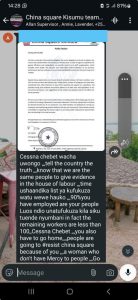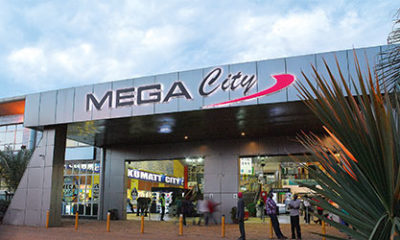Business
China Square Faces Allegations of Tribal Favoritism and Unfair Dismissals in Kisumu Branch
According to insiders, Kosgey, a manager at the Kisumu store, is accused of harboring a deep disdain for Luo employees while favoring Kalenjin workers, many of whom are reportedly her relatives from Soy, her hometown.

China Square, the Chinese-owned retail giant, is once again under scrutiny, this time for allegations of tribal favoritism and unfair dismissals at its new branch in Kisumu, Kenya.
Sources within the company claim that local Luo employees are being systematically targeted for demotion or dismissal, allegedly to be replaced by Kalenjin workers, particularly those with connections to a specific manager, Cess Kosgey.
The accusations have sparked outrage among locals and raised concerns about the company’s hiring practices.
Allegations of Tribal Bias and Nepotism
According to insiders, Kosgey, a manager at the Kisumu store, is accused of harboring a deep disdain for Luo employees while favoring Kalenjin workers, many of whom are reportedly her relatives from Soy, her hometown.
“This woman is really frustrating Luos. This morning, she demoted four Luo supervisors in the hardware section and replaced them with Kalenjins. Last week, she dismissed another 20 Luo employees and brought in Kalenjins from her tribe. She’s really targeting Luos,” one staff member claimed anonymously.
The situation is further complicated by allegations that Kosgey’s influence stems from her family connections within the company.
Her husband is said to be a senior manager at China Square’s headquarters in Nairobi, while her sister, identified only as Mercy, serves as the overall Human Resource Manager for China Square Holdings Kenya.
These connections have fueled accusations of nepotism and unfair labor practices.
China Square’s Response
In response to the allegations, China Square issued a statement dismissing the claims as “misinformation.” The company stated that it had conducted a thorough investigation into the matter and emphasized that recent layoffs were part of a broader staff reorganization aimed at improving operational efficiency and sustainability.
“We recently carried out a staff reorganization, which included some layoffs. This decision was made after careful evaluation of our business performance and was necessary to move toward profitability and ensure the store’s long-term viability,” the statement read.
The company also highlighted that its Kisumu branch currently employs 115 team members, over 70% of whom are from the Kisumu area. It further stressed its commitment to hiring local residents and adhering to labor laws, urging the public not to be swayed by “inaccurate statements.”
Rising Tensions and Calls for Boycott
Despite the company’s reassurances, tensions are rising in Kisumu, with residents taking to social media to express their dissatisfaction. Calls for a boycott of the store have gained traction online, with many accusing China Square of undermining local employment opportunities and fostering tribal divisions.

A screenshot from the China Square WhatsApp group, obtained by Kenya Insights, shows the management being exposed further even after the press release refuting nepotism claims.
This is not the first time China Square has faced controversy in Kenya. When the retail chain first entered the Kenyan market, it was met with resistance from local traders in Nairobi, who accused it of unfair competition. The traders even threatened to storm and shut down the stores, leading to legal battles.
Echoes of Past Controversies
The controversy in Kisumu echoes past conflicts when China Square first opened its doors in Nairobi. Back then, local traders protested against what they perceived as unfair competition, leading to legal battles and threats to forcibly close down the stores.
China Square’s expansion into Kisumu was initially seen as a positive development. The store opened a Sh. 500 million outlet in November 2024, aiming to tap into the western Kenya market following the success of its Nairobi branches. However, the recent allegations have stirred unrest among Kisumu residents. Social media platforms have been buzzing with calls to boycott the store, reflecting growing discontent and suspicion about the company’s employment practices.
Broader Implications
This situation in Kisumu highlights broader issues of tribalism and favoritism in Kenyan workplaces, often exacerbated by the influence of personal connections in business operations. As tensions rise, local authorities may need to step in to ensure compliance with national labor laws and to mediate the community’s concerns.
China Square’s management has called for calm and urged the public not to spread or be swayed by “inaccurate statements,” emphasizing their role in providing stable jobs and supporting the local economy. However, the effectiveness of these assurances remains to be seen as the community watches closely to see how these allegations are addressed.
Kenya Insights allows guest blogging, if you want to be published on Kenya’s most authoritative and accurate blog, have an expose, news TIPS, story angles, human interest stories, drop us an email on [email protected] or via Telegram
-

 Grapevine1 week ago
Grapevine1 week agoRussian Man’s Secret Sex Recordings Ignite Fury as Questions Mount Over Consent and Easy Pick-Ups in Nairobi
-

 News5 days ago
News5 days agoTHE FIRM IN THE DOCK: How Kaplan and Stratton Became the Most Scrutinised Law Firm in Kenya
-

 Investigations1 week ago
Investigations1 week agoMulti-Million Dollar Fraud: Three Kenyans Face US Extradition in Massive Cybercrime Conspiracy
-

 Economy6 days ago
Economy6 days agoIran Demands Arrest, Prosecution Of Kenya’s Cup of Joe Director Director Over Sh2.6 Billion Tea Fraud
-

 Business7 days ago
Business7 days agoA Farm in Kenya’s Rift Valley Ignites a National Reckoning With Israeli Investment
-

 Africa1 week ago
Africa1 week agoFBI Investigates Congresswoman Ilhan Omar’s Husband’s Sh3.8 Billion Businesses in Kenya, Somalia and Dubai
-

 Business2 weeks ago
Business2 weeks agoM-Gas Pursues Carbon Credit Billions as Koko Networks Wreckage Exposes Market’s Dark Underbelly
-

 Arts & Culture1 week ago
Arts & Culture1 week agoWhen Lent and Ramadan Meet: Christians and Muslims Start Their Fasting Season Together


























